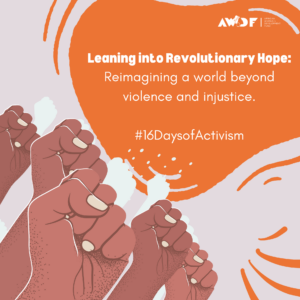Leaning into Revolutionary Hope: Reimagining a world beyond violence and injustice.

By Jodi Williams
Revolutionary hope has a longstanding history in African Feminist movements. A political practice that presents us with alternative possibilities to not become dismayed or desensitised by pervasive injustice, mass suffering and continued cycles of violence. African Feminists have long understood revolutionary hope to be an incredibly radical and transformative political principle that is strongly rooted in our deep love for justice, equity and collective liberation.
Revolutionary hope helps us visualise a future where African women, girls and Queer communities are free, safe, self-reliant and lay full claim on our land, bodies, knowledge, and autonomy. Revolutionary hope is a life-sustaining force and spiritual practice that anchors our movements as we challenge systemic oppression and create new possibilities for justice, dignity and freedom.
It is within this context that 16 Days of Activism Against Gender-Based Violence can simply not just be a calendar event. Rather, it is a call to action for fierce resistance against systems of patriarchy, imperialism and exploitation that continue to perpetuate violence against women, girls and Queer communities in Africa.
For African Feminists, 16 days forms part of a much larger ongoing struggle for collective liberation. This year’s theme “No Excuse – Unite to End Violence Against Women” serves as a clarion call to pause, reflect, gain clarity on politics and renew our commitment in the fight for justice. A much needed reminder to lean into revolutionary hope to reimagine and build a world free from violence and injustice.
As mentioned by Rosebell Kagumire in The Makings of Revolutionary Hope, How does one hope when genocide, ethnic cleansing, divide and decimate is the order of the day? How does one hope when the system constantly tests one’s humanity? These questions ring true, especially in Africa, where we see several crises unfolding around us coupled with the widespread normalisation of suffering of African peoples under dehumanising systems of brutality.
Gender-based violence (GBV) is deeply woven into our social fabric and reinforced by systems of power and control that we have inherited from our violent colonial past. The violence we see – whether physical, sexual, psychological, economic and cultural – is a direct consequence of a world order that devalues the lives, safety and inherent humanity of women, girls and queer communities, particularly black and brown marginalised communities.
African feminists understand gender-based violence (GBV) to be an intersecting issue that stretches across cultural, political, and economic structures. A system that normalises sexual violence as a tool of terror and dehumanisation (like in the case of rape being used as a weapon of war in the Democratic Republic of the Congo). A system that denies women, children, and gender-diverse populations their bodily autonomy by normalising destructive practices including child marriage, forced marriages, and genital mutilation. A system of interconnected oppressive structures that African feminists seek to dismantle.
To trace the footprints of revolutionary hope in African Feminist Movements is to encounter many powerful examples of feminists who have remained steadfast in their pursuit of freedom. One such example from my own history is that of the homecoming of Sarah Baartman. Sarah Baartman was a Khoikhoi woman who was enslaved and taken from South Africa in the early 1800s to be exhibited in “human zoos” in Europe. Sarah was objectified and gawked at in inhumane and dehumanising ways. When she died, her remains were displayed in a Paris museum until 1985.
In 2002, after years of advocacy by African Feminists, Sarah Baartman’s remains were returned to South Africa and laid to rest in accordance with traditional customs. Sarah Baartman’s posthumous homecoming to a post-Apartheid society stands as a symbol of the struggle against racism, colonialism and gender-based violence across the continent. A reminder that there is hope that you will achieve a certain degree of progress – even if it is after death.
To trace the footprints of revolutionary hope is to encounter many present-day examples of feminists who are at the forefront of challenging deeply ingrained patriarchal violence. The feminists that dare to dream. The feminists that remind us that tasting liberation is possible. The feminists that anchor us in the belief that future generations will reap the fruits of the work we do now.
Revolutionary hope helps to fuel the flames of justice in our movements. It’s natural to feel overwhelmed by the persistent injustice and violence that surrounds us – that’s exactly what the system intends. But what if, in the face of it all, we lean into community, deepen our solidarity across struggles and lines of privilege, build mutual aid and build collective power? Because a world free from violence and injustice is possible. It is revolutionary hope that reminds us of that.
Freedom is possible. Dismantling systems of oppression and violence is possible. Revolutionary hope is not passive or docile; it is vigorous, it is powerful, it is embodied and moreover, it is strongly rooted in collective resistance and solidarity.
Written by: Jodi Williams, Knowledge and Voice Specialist|Nurturing and Community Cluster at the African Women’s Development Fund
